牛津译林版英语八下U7
Unit 7 复习课件牛津译林版英语八年级下册

proud adj. 骄傲的,自豪的 ①以...为荣;为...感到骄傲
be proud of+n./doing ②为做某事感到骄傲/自豪
be proud to do sth
pride n.骄傲,自豪 ①以...为自豪 take pride in... ②是...的骄傲,自豪 be the pride of...
4. 汉译英时,用英语表达汉语的”被,由,所,为“等意思时。 The telephone was invented by Bell. 电话是贝尔发明的。
使役动词短语被动语态变化: make sb do sth sb be made to do sth
have sb do sth sb be had to do sth
English__is_t_a_u_g_h_t_(teach) in their school. 句中无by sb/with sth,此时要分析句中的主语和谓语之间是否存在逻辑上的动宾关系。 English不可能发出teach的动作。
1.by短语在被动语态中的位置 ①紧挨在被动句谓语中的过去分词后
据说昨天他爬上屋顶了。
It is said that he cilmbed to the top of the house yesterday. ③汉语中没有”被,由“等词但是在原句中加”是“这类词且句意通畅。
这些歌通常是男生唱的。(在”是“后面可以加上”由“)
These songs are usually sung by boys. ④某些句子习惯上用被动语态表示礼貌。
He was made monitor of the class.
③说话人本身是行为者,但出于某种考虑(如为了表示礼貌,措辞婉转等),不愿 说出自己的行为者时。
牛津译林版英语八年级下册《Unit 7 International Charities Welcom
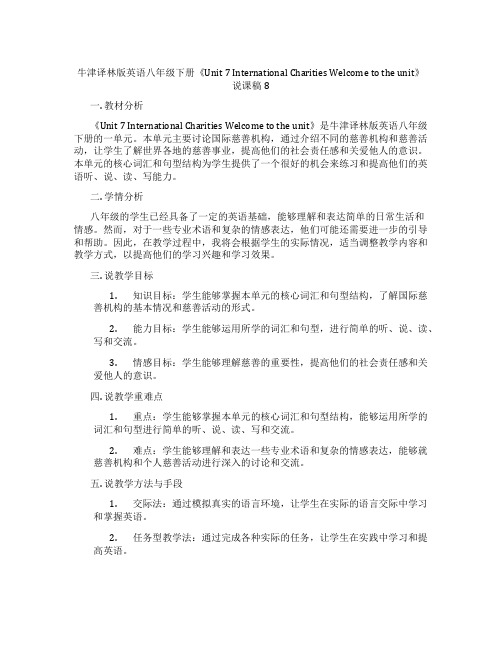
牛津译林版英语八年级下册《Unit 7 International Charities Welcome to the unit》说课稿8一. 教材分析《Unit 7 International Charities Welcome to the unit》是牛津译林版英语八年级下册的一单元。
本单元主要讨论国际慈善机构,通过介绍不同的慈善机构和慈善活动,让学生了解世界各地的慈善事业,提高他们的社会责任感和关爱他人的意识。
本单元的核心词汇和句型结构为学生提供了一个很好的机会来练习和提高他们的英语听、说、读、写能力。
二. 学情分析八年级的学生已经具备了一定的英语基础,能够理解和表达简单的日常生活和情感。
然而,对于一些专业术语和复杂的情感表达,他们可能还需要进一步的引导和帮助。
因此,在教学过程中,我将会根据学生的实际情况,适当调整教学内容和教学方式,以提高他们的学习兴趣和学习效果。
三. 说教学目标1.知识目标:学生能够掌握本单元的核心词汇和句型结构,了解国际慈善机构的基本情况和慈善活动的形式。
2.能力目标:学生能够运用所学的词汇和句型,进行简单的听、说、读、写和交流。
3.情感目标:学生能够理解慈善的重要性,提高他们的社会责任感和关爱他人的意识。
四. 说教学重难点1.重点:学生能够掌握本单元的核心词汇和句型结构,能够运用所学的词汇和句型进行简单的听、说、读、写和交流。
2.难点:学生能够理解和表达一些专业术语和复杂的情感表达,能够就慈善机构和个人慈善活动进行深入的讨论和交流。
五. 说教学方法与手段1.交际法:通过模拟真实的语言环境,让学生在实际的语言交际中学习和掌握英语。
2.任务型教学法:通过完成各种实际的任务,让学生在实践中学习和提高英语。
3.情境教学法:通过创设各种真实的情境,让学生在情境中学习和理解英语。
六. 说教学过程1.导入:通过展示一些慈善机构的图片,引导学生谈论慈善机构和个人慈善活动,激发他们的学习兴趣。
牛津译林版英语八年级下册课件Unit 7 International charit Task课件新
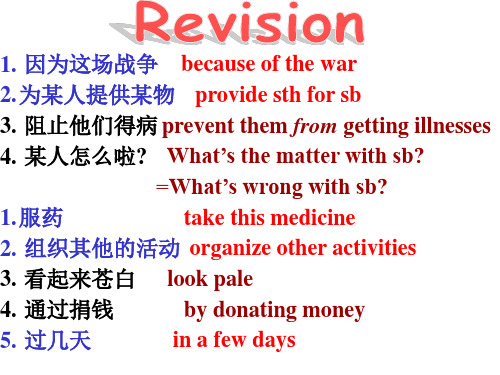
根据句意及中文提示完成单词 (抢答时间)
1. Thousands of people __a_t_te__n_d_e_d(出席)the
meeting last week.
2. The girl with long hair is a __s_e_c_r_e_t_a_ry__( 秘书)
of my company.
3. What did Mandeep use to do ?
A farmer.
4. What does she do now ?
A student .
C You want to write a report on the work of UNICEF. Search for information on the Internet. You can also use the information below. Use Amy’s report as a model.
One day, a UNICEF worker came to Mandeep’s village and learnt about the conditions of the local people.
He said it was important for children to receive education. He wanted all the children in the village to learn to read.
Diana was afraid of flying.
A: What did she learn about on TV ? B: She learnt about ORBIS on TV.
A: What was she doing ? B: She was training as a nurse.
牛津译林初中八年级下册英语 Unit 7 International Charities comic

Warming up
Have you ever done anything for charities? Were you happy to help charities? What charities do you want to help?
Let’s learn the different charities in China!
▶但是当句子的主语与不定式的主语不一致
时,常需在不定式前补加一个介词短语for sb.,即:too…for sb. to do sth.
e.g. 对我来说这个问题太难解决了。 The problem is ___t_o_odifficult___f_o_r ___m_ e ____to___w_o_r_k___o_u.t
He wants to have lunch first because he is too weak to walk any further. 4. How far will they go?
They only have five kilometres left.
Work in pairs and read the conversation between Eddie and Hobo. You can add your own ideas.
e.g. 他太矮了没法够到苹果 He is __to_o___ short __t_o__ reach the apple. → He is ____so__ short __t_h_a_t__ he can’t reach the apple. He is __n_o_t_ _t_a_l_l __ _e_n_o_u_g_h__ ___t_o_ reach the apple.
江苏专版牛津译林八年级下册Unit7知识点复习总结

江苏专版牛津译林八年级下册Unit7知识点复习总结译林版八下U7知识点总结1.You have some pocket money left.你有一些剩余的零用钱。
解析:句中left是动词leave的过去分词,意为“剩下的,余下的”,在句中作后置定语修饰pocket money。
固定结构have sth. left 意为“剩下/剩余某物”。
如: ? I have a little milk left.我剩了一点牛奶。
2.It helps build a better world for everyone, especially children all over the world.它帮助为每个人,尤其是全世界的孩子们建造一个更好的世界。
解析:especially,副词,意为“特别,尤其”,在句中可修饰名词、动词、形容词介词短语等,especially多放在它所修饰的内容的前面,后面常跟强调的内容,在句中作状语。
如: ? I love the country, especially in spring.我喜欢乡村,尤其在春天的时候。
The sun looks especially beautiful from this angle.太阳从这个角度看起来特别美。
拓展:special,形容词,意为“特别的;特殊的”,副词为specially,意为“特意;专门地”。
如: ? He came here specially to get a grammar book.他专门来这儿买一本语法书。
3.It provides basic education for children in poor areas.它为贫困地区的孩子提供基础教育。
解析:education,不可数名词,意为“教育”。
如: ? She received medical education in Japan.她在日本受过医学教育。
拓展:①education的动词为educate,意为“教育;教养”,固定结构educate sb to do sth.意为“教育某人做某事”。
牛津译林版八年级英语下册Unit7InternationalCharitiesP4IntegratedSkills精品课件

4 UNICEF raises money by selling Christmas cards and organizing other activities.
1 UNICEF works all over the world.
Doctor: You look pale. What’s the matter? Boy: I don’t feel well. I’ve got toothache. It hurts. Doctor: How long have you felt like this? Boy: For about two days. Doctor: OK. Open your mouth and let me have a check... Well, it’s nothing serious. Take this medicine after meals three times a day. You’ll be all right in a few days. Boy: OK. Thanks.
A boy goes to a health centre of UNICEF. He is talking to the doctor. Work in pairs and ask your partner about his or her problem. Use the conversation below as a model.
1.When was UNICEF set up? 2. Why was UNICEF set up? 3. Where does UNICEF work? 4. What does UNICEF do to help? 5. How does UNICEF raise money?
牛津译林初中八年级下册英语 Unit 7 International Charities

A3 Mr Wu asked the students to write a report on UNICEF. First, he gave them some questions to help them organize their ideas. Help Daniel answer the questions with the information in Parts A1 and A2.
A The work of UNICEF
A2 Daniel is listening to a radio programme about UNICEF. Help him put the sentences in the correct order. Write the numbers 1—5 in the boxes.
3 UNICEF provides basic education for poor children in many countries. It helps them go to school.
2 UNICEF provides clean water and food. It wants all children to be healthy.
Words & phrase review
war pale matter check
n. 战争 adj. 苍白的 n. 事情,问题 n. 检查
Objectives
➢ To listen for details about UNICEF ➢ To respond to information obtained from listening by completing the passage ➢ To learn to make a conversation with your partner with the sentence pattern:
牛津译林版英语八年级下册《Unit 7 International Charities Welcom

牛津译林版英语八年级下册《Unit 7 International Charities Welcome to the unit》说课稿1一. 教材分析《Unit 7 International Charities Welcome to the unit》是人教版牛津译林英语八年级下册的一单元。
本单元的主题是国际慈善机构,主要介绍了一些国际知名慈善机构及其公益活动。
教材通过丰富的文本材料,引导学生关注社会问题,培养学生的社会责任感和同情心。
本单元的主要内容包括:1. 介绍几家国际慈善机构,如红十字会、绿色和平等;2. 讨论慈善机构的作用和意义;3. 引导学生思考如何参与慈善活动,如何关爱他人。
二. 学情分析八年级的学生已经具备了一定的英语基础,能够进行简单的阅读、听说和写作。
但他们在语言表达、逻辑思维、文化背景等方面还存在一定的困难。
因此,在教学过程中,教师需要关注学生的个体差异,充分调动他们的积极性,激发他们的学习兴趣。
三. 说教学目标1.知识目标:学生能够掌握本单元的重点词汇、句型和语法结构,了解国际慈善机构的基本情况。
2.能力目标:学生能够运用英语进行简单的阅读、听说和写作,提高他们的英语综合运用能力。
3.情感目标:学生能够关注社会问题,培养他们的社会责任感和同情心,学会关爱他人。
四. 说教学重难点1.重点:本单元的重点词汇、句型和语法结构。
2.难点:慈善机构的作用和意义,以及如何参与慈善活动。
五. 说教学方法与手段1.教学方法:采用任务型教学法,让学生在完成任务的过程中,自然地学习和掌握语言知识。
2.教学手段:利用多媒体课件、网络资源等,为学生提供丰富的学习材料,提高他们的学习兴趣。
六. 说教学过程1.导入:通过展示一些国际慈善机构的图片,引导学生关注本节课的主题。
2.呈现:介绍一些国际知名慈善机构,如红十字会、绿色和平等,让学生了解它们的基本情况。
3.探究:讨论慈善机构的作用和意义,引导学生思考如何参与慈善活动,如何关爱他人。
牛津译林版英语八年级下册《Unit 7 International Charities Welcom
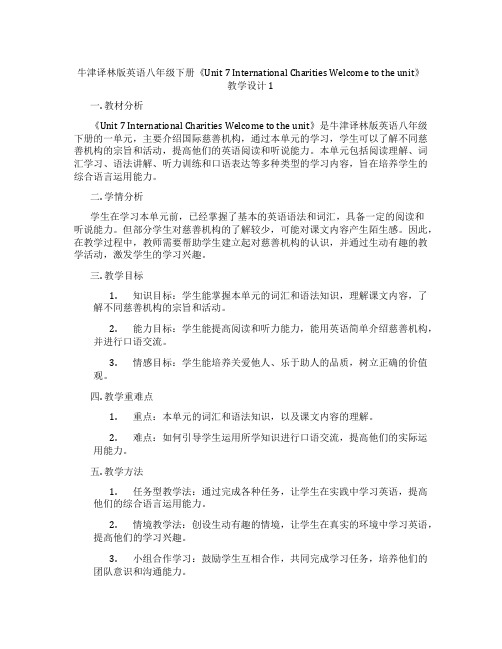
牛津译林版英语八年级下册《Unit 7 International Charities Welcome to the unit》教学设计1一. 教材分析《Unit 7 International Charities Welcome to the unit》是牛津译林版英语八年级下册的一单元,主要介绍国际慈善机构,通过本单元的学习,学生可以了解不同慈善机构的宗旨和活动,提高他们的英语阅读和听说能力。
本单元包括阅读理解、词汇学习、语法讲解、听力训练和口语表达等多种类型的学习内容,旨在培养学生的综合语言运用能力。
二. 学情分析学生在学习本单元前,已经掌握了基本的英语语法和词汇,具备一定的阅读和听说能力。
但部分学生对慈善机构的了解较少,可能对课文内容产生陌生感。
因此,在教学过程中,教师需要帮助学生建立起对慈善机构的认识,并通过生动有趣的教学活动,激发学生的学习兴趣。
三. 教学目标1.知识目标:学生能掌握本单元的词汇和语法知识,理解课文内容,了解不同慈善机构的宗旨和活动。
2.能力目标:学生能提高阅读和听力能力,能用英语简单介绍慈善机构,并进行口语交流。
3.情感目标:学生能培养关爱他人、乐于助人的品质,树立正确的价值观。
四. 教学重难点1.重点:本单元的词汇和语法知识,以及课文内容的理解。
2.难点:如何引导学生运用所学知识进行口语交流,提高他们的实际运用能力。
五. 教学方法1.任务型教学法:通过完成各种任务,让学生在实践中学习英语,提高他们的综合语言运用能力。
2.情境教学法:创设生动有趣的情境,让学生在真实的环境中学习英语,提高他们的学习兴趣。
3.小组合作学习:鼓励学生互相合作,共同完成学习任务,培养他们的团队意识和沟通能力。
六. 教学准备1.教学课件:制作课件,内容包括课文讲解、词汇学习、语法讲解等。
2.教学素材:收集关于慈善机构的图片、视频等素材,用于教学展示。
3.听力材料:准备相关的听力材料,用于训练学生的听力能力。
Unit 7 知识点 2022-2023学年牛津译林版八年级英语下册

U7 International charities【comic & welcome】1.You have some pocket money left.have sth left剩下某物2.Hobo, let me have lunch first.first adv.首先常和next,then,finally等表顺序的副词一起使用,用来描述某件事情的先后顺序3.It helps build a better world for everyone, especially children all over the world. [especially] adv.特别,尤其修饰动词、形容词或整个句子;especial adj.特别的,特殊的4.It provides basic education for children in poor areas.[basic] adj.基础的,基本的basic education基础教育basic needs基本需求[education]不可数名词“教育” get/receive education接受教育educational adj.教育的;有教育意义的educate vt.教育;培养educate sb to do sth教育某人做某事educator n.教育家;教育工作者5.It works for the equal rights of girls and women too.[equal] adj.平等的,相等的,能胜任的equal rights平等的权利be equal to....等于,等同,能胜任[right] n.权利the right of sb某人的权利the right to... ... 的权利6.It also works to prevent the spread of some serious diseases, like AIDS, among young people. [prevent] vt.阻止,预防prevent sb (from) doing sth = stop / keep sb from doing sth阻止某人做某事prevent the spread of some serious diseases阻止一些严重疾病的传播[spread] ①n.扩散;分布;展开the spread of.... .... 的扩散①v.展开,传播;散布spread the news传播消息【reading】1.tell us something about blindness告诉我们有关失明的一些事情[blindness]不可数名词“失明”blind + ness adj+ness →n.类似的:kindness善良illness疾病happiness幸福carelessness粗心sadness悲伤business商业2.....mostly in poor areas , and about 80 per cent of these cases can be prevented or cured. [mostly] adv.主要地;大部分地;多半地≈mainly[cure] vt.治愈,治好cure sb of one’s illness治好某人的疾病3.However, many people don’t have money for medical treatment.[treatment] 可数名词或不可数名词“治疗” treat+ment medical treatment医学治疗4.The plane is also used as a training centre.be used as +工具、方式、手段被用作...be used for + 用途被用来...be used by sb 被某人使用be used in... 被用于....方面5.Many of our patients can’t afford to go to hospital.[patient] ①可数名词“病人,病患”①adj.能忍耐的,有耐心的be patient with sb 对某人有耐心[afford] vt.买得起;能做;承担+名词、代词、to do多用于否定句或疑问句中常与can、could、be able to连用afford to do sth承担得起做某事6.During my last visit,150 patients were operated on.[operate] vi.做手术,开刀operate on sb. = do an operation on sb给某人做某事7.I’m proud to help people see again and improve their lives.[proud] adj.自豪的,骄傲的be proud to do sth为做某事而自豪be proud of... 为...感到自豪be / feel proud that+从句很自豪....[pride]n.自豪,骄傲take pride in... = be proud of...8.Modern medicine is developing quickly and now most eye problems and diseases can be treated and cured.●[medicine] n.医学,药Modern medicine现代医学take the medicine吃药[medical] adj.医学的,医药的●[develop]v. 发展;加强develop into... 发展成...[developing]adj.发展中的[developed]adj.发达的[development]n.发展●[treat] vt. ①治疗treat sb/sth with sth 用某物治疗某人/某物treat sb for... 为某人治...病①对待;看待treat ... as.... 把...看作...carry on with sth继续做某事= carry on doing sth= go on doing sth= continue doing sth【grammar】1.[ hand out ] ①分发;发出= give out反义词:hand in 上交①提出(建议等)hand out advice提出建议2.[hold] vt. (held , held)①举行=have hold / have the sports meeting举行运动会①容纳The classroom can hold over 100students.这间教室能容纳100多名学生①握住,抓住hold one’s hand握住某人的手3.With its help, millions of poor children all over the country were given basic education. with one’s help = with the help of sb.在某人的帮助下without one’s help没有某人的帮助【integrated skills & study skills & task】1.What’s the matter?怎么了?what’s the matter (with sb?)= What’s wrong (with sb)?= What’s the trouble (with sb)?= What’s happened (to sb)?2.You’ll be all right in a few days.in a few days几天后in +一段时间→ How soon 提问3.I could not sleep at all that night.not ...at all一点儿也不;根本不not 通常与主语后面的连系动词be,情态动词或助动词等连用4.help poor people with eye problem帮助有眼部疾病的穷人5.learn about the conditions of the local people了解当地人的情况enter a school进入学校。
牛津译林版英语八年级下册《Unit 7 International Charities Welcom

牛津译林版英语八年级下册《Unit 7 International Charities Welcome to the unit》说课稿7一. 教材分析《Unit 7 International Charities Welcome to the unit》是人教版牛津译林八年级下册的一单元。
本单元主题是国际慈善机构,主要介绍了世界各地的慈善机构和慈善活动。
教材通过真实的语言环境,让学生了解和掌握慈善机构的宗旨、活动以及如何参与其中。
本单元的语言知识点包括一般现在时的被动语态、不定式作目的状语等。
二. 学情分析八年级的学生已经掌握了基本的英语语法知识,具备一定的听说读写能力。
但他们对慈善机构的了解可能有限,对国际慈善机构的认识可能更为陌生。
因此,在教学过程中,需要帮助学生建立起慈善机构的基本概念,同时提高他们的语言运用能力。
三. 说教学目标1.知识目标:让学生掌握本单元的生词、短语和语法点,了解国际慈善机构的基本情况。
2.能力目标:培养学生听、说、读、写的能力,使他们能够熟练运用所学知识描述慈善机构及其活动。
3.情感目标:培养学生关爱他人、乐于助人的品质,提高他们的社会责任感和公民意识。
四. 说教学重难点1.重点:本单元的生词、短语和语法点。
2.难点:一般现在时的被动语态和不定式作目的状语的运用。
五. 说教学方法与手段1.教学方法:采用任务型教学法,让学生在真实的语言环境中进行交际和实践。
2.教学手段:利用多媒体课件、图片、视频等辅助教学,激发学生的学习兴趣,提高课堂效果。
六. 说教学过程1.导入:通过展示慈善机构的图片,引导学生谈论慈善机构,引入本课主题。
2.新课呈现:介绍慈善机构的基本概念,讲解一般现在时的被动语态和不定式作目的状语的用法。
3.练习巩固:通过小组活动、角色扮演等形式,让学生运用所学知识进行实际操作。
4.拓展延伸:讨论如何参与慈善活动,提高学生的社会责任感和公民意识。
5.总结反馈:对本节课的内容进行总结,检查学生的掌握情况。
牛津译林版八年级英语下册Unit 7

授课教师:
八年级下册 · 课文
精品教学课件
学校:
Unit 7 International charities
Task
Charity show
Amy wants to write about the work of an ORBIS nurse called Diana for her class Presentation. She found these pictures of Diana.
Name: Mandeep Country: India Family: many children, poor In the past: used to work on the farm all day,
could not read or write One day: a UNICEF officer came and
• I think that it is sad that some children are too poor to go to school. If children learn to read and write, they will have a better future. Mandeep is lucky that she was helped by UNICEF. We are so lucky that we can come to school every day. I hope to work for UNICEF when I finish school.
• One day, a UNICEF worker came to her village. He said it was important for children to get an education. He wanted all children in the village to learn to read. He gave Mandeep some school books and she was very happy.
牛津译林版八年级英语下册Unit7 Intemational charities tingli

2. The meeting _______ two weeks ago.
A. hold
B. was held
C. were held D. is held
3. The thief ________ by the police last night.
A. caught
B. is caught
C. was caught D. were caught
Amy: I’m reading a book about Oxfam.
Daniel: Really? Please tell me about it.
Amy: OK. Oxfam _w__a_s_s_e_t_u_p__ (set up) in the UK in 1942, and the first Oxfam shop _w_a_s_o_p_e_n_e_d_ (open) in 1948. Now it has about 15,000 shops in all over the world. A lot of things _a_r_e__so_l_d__ (sell) in Oxfam shops, including books. The money _i_s_u_s_e_d_ (use) by Oxfam to help poor people.
The Olympic Games _w_e_re_ _he_l_d_ b_y_ the Chinese government last year.
What they did last week
New books _w_e_r_e_s_e_n_t_t_o_c_h_i_l_d_re_n__i_n_p_o_o_r_ _a_r_e_a_s_b_y__th_e__C_l_a_s_s_1_,_G_r_a_d_e__8_s_t_u_d_e_n_t_s_ (send/to children in poor areas/the Class 1, Grade 8 students).
牛津译林版英语八年级下册Unit7

work on the plane
(L11-L15)
Read L1-L6
information
blind
285 million
other eye problems
[keis] n. 病例
80 % of cases prevented
problem
cured [kjʊə] v. make sb.
healthy agian
Have an interview
Practise in four. One is an interviewer and the other is an ORBIS doctor, a local doctor and a patient. Make up a new dialogue.
an interviewer
What are the possible and proper ways for us to help raise money for ORBIS?
organize some activities to
1
raise money for it
2 charity shows
3 invite some superstars to advertise for ORBIS
B.bneeawfrasikdiltlos …
[ˈpeɪʃnt] n.
[əˈfɔːd] v.
patients can’t afford to go to hospital.
Amy’s chart
ORBIS, a charity uses its _F_l_y_in_g__E_y_e__H_o_s_p_i_ta_lto visit poor areas [triːt] v. treats people with ___e_y_e_p_r_o_b_l_e_m_s_
牛津译林版八年级英语下册Unit7单元知识点总结
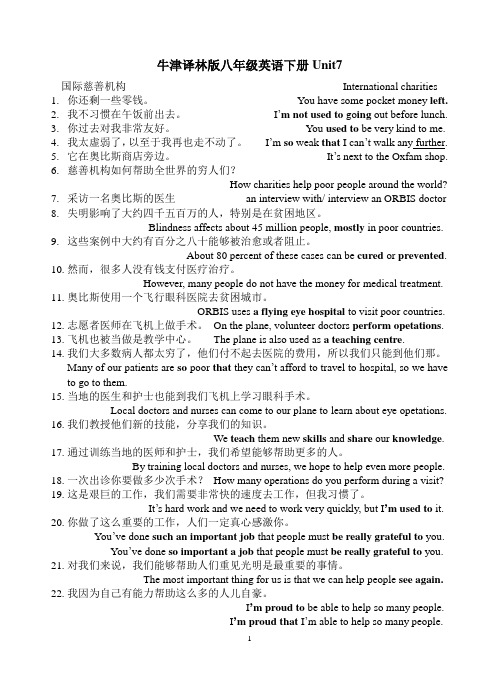
牛津译林版八年级英语下册Unit7国际慈善机构International charities1.你还剩一些零钱。
You have some pocket money left.2.我不习惯在午饭前出去。
I’m not used to go ing out before lunch.3.你过去对我非常友好。
You used to be very kind to me.4.我太虚弱了,以至于我再也走不动了。
I’m so weak that I can’t walk any further.5.它在奥比斯商店旁边。
It’s next to the Oxfam shop.6.慈善机构如何帮助全世界的穷人们?How charities help poor people around the world?7.采访一名奥比斯的医生an interview with/ interview an ORBIS doctor8.失明影响了大约四千五百万的人,特别是在贫困地区。
Blindness affects about 45 million people, mostly in poor countries.9.这些案例中大约有百分之八十能够被治愈或者阻止。
About 80 percent of these cases can be cured or prevented.10.然而,很多人没有钱支付医疗治疗。
However, many people do not have the money for medical treatment.11.奥比斯使用一个飞行眼科医院去贫困城市。
ORBIS uses a flying eye hospital to visit poor countries.12.志愿者医师在飞机上做手术。
On the plane, volunteer doctors perform opetations.13.飞机也被当做是教学中心。
牛津译林版英语八年级下册Unit7课件(15张PPT)

Think and talk
• What do you think of Dr Ma's work in ORBIS? Is it worthy? • Is charity important for us? Why?
Support charity
Make a poster to introduce Dr Ma and his work. Each group member needs to introduce part of his
plane? • because many patients can't afford to go to hospital,
so the ORBIS has to go to them.
Share your ideas
• How many patients did Dr Ma help? And how does he feel?
04 line 16- How many operations do you do
20 during a visit?
05
line2126
Is there anything else you'd like to say to our readers?
Part 1(Lines1-6) Part 2(Lines7-15) Part 3(Lines16-20) Part 4(Lines21-26)
the work of ORBIS Dr Ma’s work and feeling Dr Ma’s hope something about blindness
The work of ORBIS
Read the part2 (line7-15) and finish the task on P96
牛津译林版英语八下Unit 7《International charities》(welcome t

牛津译林版英语八下Unit 7《International charities》(welcome to unit)教学设计一. 教材分析牛津译林版英语八下Unit 7《International charities》主要介绍国际慈善,通过学习本单元,学生能够了解不同慈善的宗旨、活动以及如何参与其中。
教材以真实的慈善活动为背景,引导学生关注社会问题,培养学生的社会责任感和关爱他人的意识。
本单元包括阅读、听说、写作等多种技能训练,有助于提高学生的综合语言运用能力。
二. 学情分析八年级的学生已经具备了一定的英语基础,能够理解和运用简单的英语进行日常交流。
但他们在阅读理解、听力、口语表达等方面还存在一定的困难。
此外,学生对于慈善的了解相对较少,因此需要在教学中引入相关背景知识,帮助学生更好地理解教材内容。
三. 教学目标1.知识目标:学生能够掌握与国际慈善相关的词汇和表达方式,了解不同慈善的宗旨和活动。
2.技能目标:学生能够通过阅读、听说、写作等方式,运用所学知识进行交流和表达。
3.情感目标:学生能够培养关爱他人、关注社会的意识,提高社会责任感和同理心。
四. 教学重难点1.重点:学生能够掌握与国际慈善相关的词汇和表达方式,了解不同慈善的宗旨和活动。
2.难点:学生能够运用所学知识进行阅读理解、听力、口语表达和写作。
五. 教学方法1.任务型教学法:通过小组讨论、角色扮演等任务,激发学生的学习兴趣,提高学生的参与度。
2.情境教学法:创设真实的生活情境,让学生在实践中感知和运用英语。
3.交际式教学法:注重师生互动、生生互动,提高学生的口语表达能力和听力理解能力。
六. 教学准备1.教师准备:提前准备好教材、教学PPT、相关视频和音频材料、慈善的宣传册等。
2.学生准备:学生提前预习教材,了解慈善的相关背景知识。
七. 教学过程1.导入(5分钟)教师通过展示一些国际知名慈善的图片,如红十字会、世界自然基金会等,引导学生关注慈善,激发学生的学习兴趣。
牛津译林初中八年级下册英语 Unit 7 International Charities
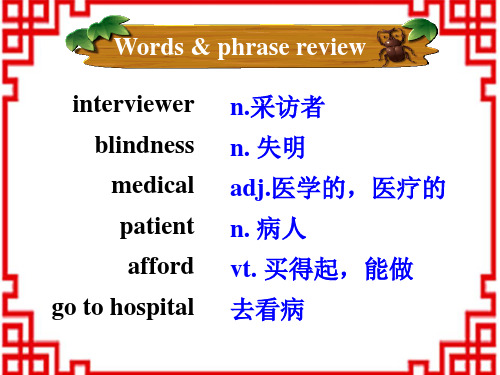
7-20lines: • Why do ORBIS doctors and nurses work on the
plane? • Is the plane only a place to do operations? • How does Dr Ma feel about the job?
1. Many patients can’t afford to go to hospital, so ORBIS doctors and nurses have to go to them.
4. He will come on time even though it rains.
4. 即使下雨,他还是会准时来的。 55. .T船he上re有ar5e0500名0乘pa客sse。ngers on board.
Game time
Now I will divide you into several groups. Make up sentences with your partners with “on”. Then speak them out. Let’s see which group is the most productive.
地 面:通过在全球五个国家的长期项目大规模 建立眼睛护理及防盲基础设施。
网络空间:通过新建立的网络视讯项目连接世 界各地的签约眼科专家,用互联网进行一对一的 技术指导以及针对单个病例的会诊。
Listen and answer
- 1、下载文档前请自行甄别文档内容的完整性,平台不提供额外的编辑、内容补充、找答案等附加服务。
- 2、"仅部分预览"的文档,不可在线预览部分如存在完整性等问题,可反馈申请退款(可完整预览的文档不适用该条件!)。
- 3、如文档侵犯您的权益,请联系客服反馈,我们会尽快为您处理(人工客服工作时间:9:00-18:30)。
初中英语学习材料madeofjingetieji《学英语随堂反馈》提高卷Test for Unit 7 of 8BClass Name一、单项填空(15%)( ) 1. Mr. Green is _______ ORBIS doctor, but he used to be _______ UNICEF worker.A. a, aB. an, aC. the, aD. an, the( ) 2. At last, the poor woman _______ that the company couldn’t afford _______ her work.A. told, paying forB. was told, payingC. told, to payD. was told, to pay for ( ) 3. —Do you know when _______?—Yes. Mr. Lee told us about it last Monday.A. was UNICEF set upB. did UNICEF set upC. UNICEF was set upD. UNICEF set up ( ) 4. Five of my classmates were chosen to do the project, __________ my close friend, Tom.A. includeB. includesC. includedD. including( ) 5. —When shall we go and play basketball? —Not until the work _______ tomorrow.A. will finishB. have finishedC. will be finishedD. is finished( ) 6. —I hear John has got a well-paid job in one of the world’s top 500 companies.—Yes. His good _______ background helps him a lot. He once studied in Oxford University.A. familyB. educationC. marriageD. life( ) 7. They should have a ________ discussion if they plan to go to a _______ place for the trip.A. further, fartherB. father; fartherC. farther; furtherD. farthest; further ( ) 8. The magazines must _______ to the library in three weeks.A. be gave backB. returnC. be returnedD. be returned back ( ) 9. The dress is made of silk. It_________ smooth.A. feels especiallyB. is felt speciallyC. feels specialD. is felt special( ) 10. The big paper box can _______ a rubbish bin for us to put waste in.A. be used toB. be use asC. be used asD. used to( ) 11. —What’s wrong with my son, doctor?—_______ serious, just a little cold. He’d better drink some water.A. EverythingB. NothingC. SomethingD. Anything( ) 12. _______ one of the people from Wuxi, I’m proud _______ the great changes here.A. For, toB. As, ofC. With, forD. Of, at( ) 13. At last, the girl was made _______ and began to do her homework.A. stop listening to musicB. to stop to listen to musicC. to stop listening to musicD. stop to listen to music( ) 14. The houses prices in our city are ______ than before, but they still ______ well at present.A. lower; don’t sellB. lower; aren’t soldC. cheaper; don’t sellD. cheaper; aren’t sold ( ) 15. —May I take some photos in the museum?—_______, or you will be in trouble.A. Go aheadB. Help yourselfC. I hope notD. You’d better not二、完形填空(10%)Once the King was ill and sent for his doctor. The doctor came, examined (检查) him carefully and said, “You will be well soon in a few days if you take bull’s(公牛的)milk.” The King was 1 , for he didn’t hear that a bull could give milk. “How is it 2 ?” He asked.“Tell Gulbo to get it for you,”answered the doctor. “He can do anything.”Gulbo was a person with great knowledge and was not 3 to the doctor. So the doctor thought this would be a way of making him terrible. When the King told Gulbo what the doctor said and told him to get bull’s milk, Gulbo certainly 4 what the doctor was trying to do.When he got home, he sat thinking how to get out of the situation. His daughter, seeing him worried, asked what happened. 5 she heard what the King asked for, she said, “Don’t worry, Father. I will help you.”The next day she took some old clothes, went to the river near the palace, and chose a place near the King’s 6 window. In the middle of the night, she started to do her washing. She made so much noise that the King could not sleep. The King got very angry and sent a soldier to find out what happened. The soldier found the girl, and took her to the King. “Why did you wash your clothes here at night?” asked the King.The girl pretended(假装)to be 7 and said, “I had to wash clothes at night. This afternoon my father had a baby. I was 8 all day because of that. Then I found there were no clean clothes for the baby, so I had to come and wash them now.”“What?” cried the King. “Are you trying to make a fool (傻瓜) of me? I have never heard of a man having a baby.”“Well, if the King himself tells someone to get bull’s milk for him, why can’t a 9 have a baby?”The King smiled and said, “You must be Gulbo’s daughter. Go and tell your father that he may 10 the bull’s milk for his baby.”( ) 1. A. pleased B. surprised C. excited D. interested( ) 2. A. possible B. necessary C. usual D. strange( ) 3. A. helpful B. friendly C. important D. generous( ) 4. A. hoped B. explained C. wondered D. understood( ) 5. A. When B. Since C. Until D. Before( ) 6. A. kitchen B. bathroom C. bedroom D. living room( ) 7. A. afraid B. brave C. clever D. careful( ) 8. A. cheerful B. helpful C. busy D. lonely( ) 9. A. bull B. man C. woman D. king( ) 10. A. keep B. buy C. borrow D. have三、阅读理解(20%)(A)Do you think there is too much noise in our city? Perhaps you do. If you live near an airport, you will probably feel unhappy because of the noise of planes. It is said that the noise of planes or trains or trucks can make one deaf if he keeps on hearing it.Noise is a kind of pollution. However, most people in our city do not seem to mind noise. They do not know it is harmful to their health. They like to enjoy music when they are doing their work. It is a new danger that music is played through powerful loudspeakers (声音大的喇叭). It can reach 120 decibels (分贝).It is known that continuous (连续不断的) noise of over 85 decibels can make people deaf. For example, when newspapers and books are being printed, the noise is over 85 decibels, and some of the workers become deaf. Scientists believe that 10 percent of all the workers in British printing offices have been deafened (使……聋) by the noise. Besides, noise of less than 85 decibels can make some people tired and nervous. We all know that too much noise makes things difficult and unpleasant. It can do great harm to health and prevent people from working well. Workers in noisy offices are not so efficient (高效的) as workers in quiet offices. Noise makes people less efficient. Can anything be done to keep down noise?In Britain, the government has made several laws to keep down noise. It has spent a good deal of money making airports and main roads quieter. In Japan, America and Canada there are such laws, too.( ) 1. _______ people in big cities know noise does harm to their health.A. FewB. MostC. NoD. Many( ) 2. Many people working in printing offices become deaf because _______.A. they keep on hearing the noise of the machinesB. they are not used to the noise of the machineC. the noise of the machines is below 85 decibelsD. they don’t know the noise will harm their hearing( ) 3. If you often hear the noise below 85 decibels, you will _______.A. become deafB. feel tiredC. be happyD. work harder( ) 4. Workers in noisy offices are not so _______ as workers in quiet offices.A. efficientB. harmfulC. nervousD. unhappy( ) 5. When a person visits a factory full of loud noise, _______.A. he will become deafB. he will feel uncomfortableC. his hearing will be greatly harmedD. he will never mind the noise(B)My father woke me up early one summer morning when I was fourteen and announced (宣布), “Get up,you’re going with me to cut the grass in the garden.”The idea that my father thought I was old enough to help him in his business made me feel proud and excited. From sunup to sundown, my father, my younger brother and I worked in the large garden. By the end of the day I was too tired to say a word but I felt good. This was my first time to help my father in his business. I got $ 6 for my work that day.One day my father found some leaves I had missed and pulled me aside (拉到一边). “Take away these leaves!” he said. “A nd don’t make me have to tell you to do it again.” The message was clear. That day I valued (珍视) the importance of doing a job well for the first time. It will never fail to impress (给……留下印象) the person you are working for.After two years, my father told me and my brother that he felt we were old enough to cut the grass by ourselves. Every Saturday during my last two years of high school, we set off early in the morning with the same strong wish we had got while working under our father.Looking after the garden was not exciting or high paying, but that didn’t matter. It taught me that any job was a good job and that what I was paid was more than I had before.A newspaper r eporter once asked me how someone could possibly live with hard work and low pay. “If you’re only thinking about hard work and money, you probably don’t want to do any better than you are doing,” I answered. In every job, from cutting the grass to washing dishes, I’ve learned much. I’ve learned something that helps me in my next job.If you work hard enough, you can learn from any job you do.( ) 6. The writer felt proud and excited when he was asked to cut the grass because he thought _______.A. he could cut the grass himselfB. he could make much moneyC. he could enjoy sunup and sundownD. he could help his family( ) 7. The underlined word “message” in the passage probably refers to _______.A. not leaving leaves behindB. giving no excuse (借口) for your mistakesC. doing a good job at the very beginningD. missing things which can be found out( ) 8. When the writer finished high school, maybe he was _______.A. fourteenB. eighteenC. twentyD. twenty-two( ) 9. Which of the following may the writer think is the most important?A. Keeping learning from any job you had.B. Asking no money for work.C. Finishing work as quickly as possible.D. Keeping looking for different jobs.( ) 10. Maybe the writer thinks his father is _______.A. lazyB. helpfulC. carelessD. funny四、词形变化(5%)1. Most of the people in the south live _______________ (most) on rice.2. Hurry up! The _______________ (interview) has been there for 10 minutes.3. Have you received any letters from your _______________ (read)?4. He has nothing to do with his _______________ (blind) but to wait for the operation.5. He sat by the _______________ (patient) and passed them each an apple.五、根据句意和汉语注释,写出单词的正确形式(10%)1. Take the _______________ (药) and have lots of water, and you’ll be better soon.2. We are quite _______________ (骄傲) that he has made such great progress this term.3. This plan will win the support of many people, _______________ (尤其) in today’s China.4. Thousands of people in Asia died in World _______________ (战争)Ⅱ?5. Why does your brother’s face look so ______________ (苍白)? What’s wrong?6. Please have a ________________ (检查) of your homework carefully before you hand it in.7. I’d like to be a _______________ (秘书) first after I finish my study.8. The highest temperature can be 50℃in ____________ (印度) in summer.9. I think something must be done to prevent the ____________ (传播) of disease.10. Nobody knew what was the _______________ (麻烦事) with the young boy at that time.六、动词填空(10%)1. Could you tell me when the charity walk _______________ (take) place every year?2. We had a competition last week. But only a few top results _______________ (record).3. A number of students _______________ (organize) another donation to help the deaf at present.4. To do this would be _______________ (cut) feet to fit the shoes.5. A lot of money _______________ (raise) to provide poor children with food and clothes every November.6. We _______________ (hold) this kind of charity show every year since 2010.7. The little girl _______________ (operate) on tomorrow afternoon. She’s not nervous at all.8. We are not sure if this kind of disease can _______________ (cure) in the future.9. No one can explain why that important letter _______________ (not find) at that time.10. —Jack, I think you play the music too loudly.—Sorry, I _______________ (not realize) it. I will turn it down right now.七、任务型阅读(10%)Hey! Mother’s Day is coming. Have you planned something good for your mom? If not, try one of these tips. What’s Her Favorite?Buy her something she likes and wrap (包装) it carefully. The best time to give her that is while she is sleeping at night. Put it on the drawer next to her so that when she wakes up she’ll be surprised to see it.Treat a QueenYour house is a palace with a king and queen (it doesn’t matter if you’re rich or poor). Our mother is the real queen in our life and in our family though (虽然) her duties make her look like she is not. Give the lady a day off andyou can do the housework.Maybe you could take some of your savings to treat her in the department store. Then, choose nice clothes that would make her look beautiful!Have Some of Your TimeWhat’s your best moment with her? Have you ever had a good time with your mother not talking about your problems? Have you ever told her how much you thank her for the life she gave to you? Maybe you can tell her how happy you were when she was there looking after you during your painful days in your life.Tell the magic wordsThose three words can make her heart jump for joy, you know? Just tell her “I love you!” and it would make her smile so sweetly. Just try! We don’t want to miss a thing, right?Tips on how to make your mother happyBuy a (1) for your mother B uy her something that she likes best;Put it on a drawer next to her to give her a (2) .Treat your mother as a queen Do the housework instead of her to make her (3) ;Buy her nice clothes to make her beautiful again.Have some of your time Remind (提醒) her of your best moment with her;Don’t talk with her about some problems;Tell her you were so happy when she (4) care ofyou during painful days.Tell the magic words Tell her “I love you!” to make her heart jump fo r joy;Just have a (5) and take action right now.八、完成句子(10%)1. 医生认为这个病人应该继续他的治疗。
